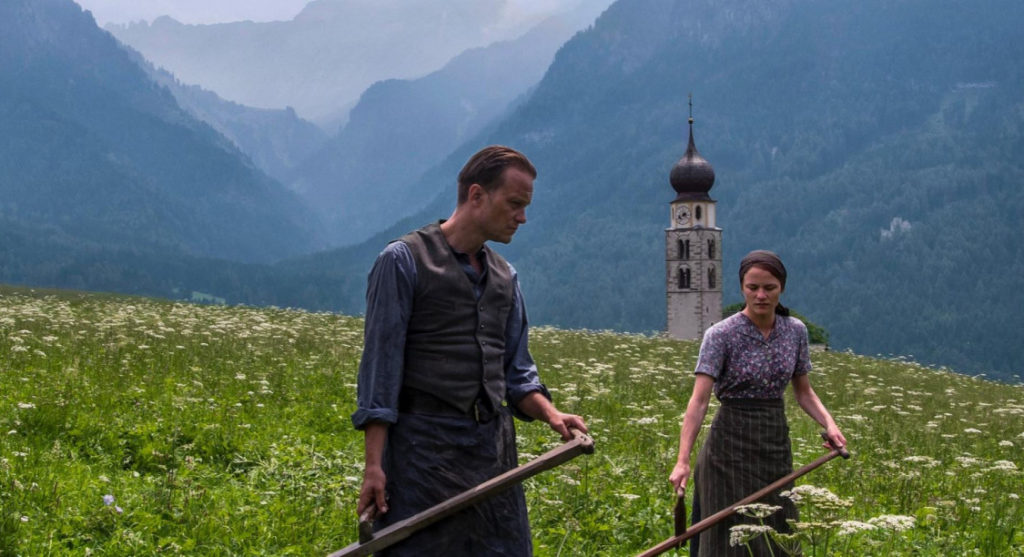
Terrence Malick’s style of filmmaking is an acquired taste. It is meditative cinema. His films are beautifully shot capturing vast landscapes. I’ve always been drawn to his artistic vision. He uses the camera like a poet uses his pen. Some of my favorite Malick films are ‘The Tree of Life’ starring Brad Pitt and ‘Knight of Cups’ starring Christian Bale. In his latest work ‘A Hidden Life,’ he achieves one of his most focused plots in recent memory. It is loosely based on a true story of an Austrian conscientious objector in World War II. Although the three hour running time feels like an endurance test, it is one of Malick’s best films in years.
If you’re a true cinephile, let’s take the plunge together. Franz (August Diehl) and Fani (Valerie Pachner) live with their young daughters in the Austrian mountains as farmers. There are gorgeous nature shots provided by cinematographer Jorg Widner interspersed with black and white archival footage of the rise of the Third Reich. When the villagers begin to adopt the ideology of the Nazis, Franz is having none of it after returning from a stint in basic training. He is not willing to fight in an unjust war and pledge allegiance to Hitler. At first, he is able to continue farming and rolling around the fields with this beautiful wife Fani. When the bike messenger sends him his draft notice, things gradually change. The villagers resent his decision not to fight.
It is not an easy decision for Franz to make. The film goes into everything he loses for his staunch principles. He ends up in jail, tortured and humiliated by the prison guards. They do everything in their power to break him. The villagers are devoutly loyal to Hitler. They treat anyone who defies him as a heretic. Malick chronicles the man’s journey like a religious pilgrimage. His lawyer urges him to sign a contract to end the madness. He is even offered a job in a military hospital. He refuses to swear his loyalty to Hitler. His lawyer makes a good point to him. He asks Franz if it really matters that he’s not carrying a rifle and wearing a uniform when he still has to shine the German soldiers’ boots and fill their sandbags. By continuing his resistance, he risks being put to death. This cannot end well. His wife Fani takes a train ride to Berlin to persuade her husband to go along with the Nazis so he can return to the family one day. Again, he refuses.
Some audiences might find this frustrating. Here is a man that is willing to sacrifice his wife and children for his principles against the war. The question that kept running through my mind was “Is it morally right to allow his wife and children to suffer for his beliefs? It is a difficult question to answer. Many would take the path of least resistance and serve their time during the war to get back to the farm. The film spends countless scenes of what he will lose if he continues to defy his obligation to the war effort. The film also spends a good deal of time with Franz being subjected to the wrath of the Nazis while he is incarcerated. These are hard scenes to watch. I’m sure it is Malick’s way of driving home the point of what sacrifices Franz makes to stick to his beliefs. But will it make any difference in the grand scheme of things?
Malick fans will defend ‘A Hidden Life’ as a brilliant art film. There is no doubt that it is one of the most throught-provoking films of 2019. It is signature Malick. He loves using the fish eye lens for close-ups and wide angle stunning nature shots to make an existential statement. Malick does not just make a film, he creates a spiritual cinematic journey. With that said, my only complaint is that the film’s three hour running time could be edited to one and a half hours. It’s simply too long. Malick’s stream of conscious filmmaking might not be for everyone but he is one of the greatest auteurs of our time.


